| July 2000 Film Music CD Reviews | Film Music Editor: Ian
Lace Music Webmaster Len Mullenger |
|
index
page/monthly
listings/July/
 For
those wishing to print these reviews without CD cover graphics
there are scrolling copies available
For
those wishing to print these reviews without CD cover graphics
there are scrolling copies available
Month by Month
index Alphabetical composer
index
© Film Music on the Web 2000.
All rights retained.Reviewers retain copyright on their
reviews.
Return to the July Index with thumbnails Part 4 [Part 1] [ Part 2] [Part 3] [Part 4]
CDs may be purchased from the retailers listed at the bottom of the page with a saving of around 22% Donations Disclaimer
Curio Corner
************************************************************** EDITOR’s RECOMMENDATION July 2000 **************************************************************
Miklós RÓZSA
Concerto for Violin and Orchestra.
Concerto for Cello and Orchestra.
Theme and Varaiations for Violin, Cello and Orcherstra
Robert McDuffie (violin), Lynn Harrell (cello)
Yoel Levi conducting the Atlanta Symphony Orchestra
TELARC CD-80518 [71:48]
Crotchet Amazon UK Amazon USA
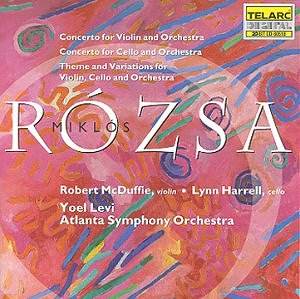
Even when he wrote chamber or instrumental music Miklós Rózsa did not write small, and the two concertos and 'theme and variations' on this disc offer big, thoroughly idiomatic, Rózsaian music. Known, if at all, to the general public as the man who wrote the music for Ben-Hur, El Cid, Quo Vadis, unlike many 'film composers' Rózsa never abandoned the concert hall, hence the title of his autobiography, A Double Life. And like the best composers, he wrote appropriately to the medium in his own instantly recognisable style. So, if you love the music of Miklós Rózsa you will be thoroughly at home here. I shall nail my colours to the mast so you may begin taking pot-shots: Rózsa was the finest film composer in history, and his concert works deserve to see him established as one of the major 20th century 'serious' composers. All three works here are marvellous advocates for his acceptance.
The Concerto for Violin and Orchestra, Op 24 dates from 1956. Despite the composer's claim in his autobiography that he always had been concerned to prevent the two parallel lines of his career meeting, elements from the concerto may be familiar from the savaged remains of a possible Billy Wilder film masterpiece, The Private Life of Sherlock Holmes (1969) (the corpse remaining after studio butchery is currently in rotation in it's 'scope ratio on Film Four). We can assume that Rózsa reworked some of this violin music for the great violin-playing detective, not because he held his own work in such low regard that he felt no shame in recycling it into 'mere movie music', but because he took cinema seriously. After all, this is no isolated incidence. Parts of the Viola concerto, Op 37 and the score for Time After Time (1979) are close to identical.
The violin concerto was written for Heifetz, and premiered by him in Dallas on January 15, 1956. It is wonderfully rich and boldly romantic music, clearly influenced by the folksong of Rózsa's native Hungary, and full of vigour and thrillingly explosive writing. Just try the finale to the opening Allegro non troppo ma passionato. Robert McDuffie plays as if his life depended upon it, and the result is exhilarating.
The Concerto for Cello and Orchestra, Op. 32 was written 12 years later for János Starker. There is a really ferocious energy to this score, a work full of dynamic fury and impassioned romanticism. Epic in every sense, Rózsa's orchestrations demand riveted attention while the endlessly questing, probing, interrogative solo line refuses to let go. Lynn Harrell offers deeply lyrical, yet where necessarily utterly commanding playing. A hero of legend leading his forces into battle. The closing Allegro vivio is indomitable.
The Theme and Variations for Violin, Cello and Orchestra, Op. 29a (1958) unites the soloists in a single movement lasting 12 minutes. Due to complex circumstances, the piece is actually a re-orchestrated version of the central movement from the Sinfonia concertante, Op29. Again, this is folk-like, rapturously melodic music, the variations moving through various moods from the argumentative to sweeping romance to a final calm.
Throughout, the playing and sound are first-rate, both appropriately full of summer fire. If you don't know the music of Miklós Rózsa this album is a great place to start. Imagine a composer comparable to Bax, Bartók, Rachmaninov, and start to explore. If you are familiar with Rózsa you need no recommendation from me. Just enjoy one of the most thrilling releases of the year so far.
Reviewer
Gary S. Dalkin

Collection: Leonard BERNSTEIN
Bernstein Tribute
music by, plus Anthony Dilorenzo & Charles Pillow
Proteus 7
Dorian xCD-90278 * [65:57]
Fancy Free suite, West Side Story suite, Mass (six selections), Divertimento for Orchestra, Wrong Note Rag (Bernstein,) Mostly Influential (Dilorenzo) Suite from West Side Story (Pillow)
Crotchet Amazon UK Amazon USA
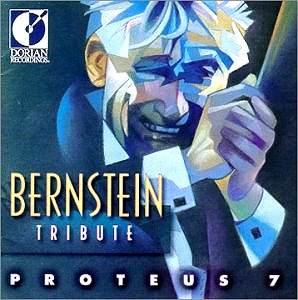
Collection: Leonard BERNSTEIN, George GERSHWIN, Duke ELLINGTON
On the Town
Center City Brass Quintet
Chandos CHAN 4554 * [66:55]
Crotchet Amazon USA
Bernstein Suites: On the Town & West Side Story, Gershwin: Porgy and Bess. Ellington: 'Caravan', Chelsea Bridge (melody by Billy Strayhorn), 'Do Nothin' Till You Hear from Me'.
How composed can music be and still be considered jazz? While you consider than philosophical conundrum let me introduce the first guests tonight. Step up the Proteus 7, an ensemble comprising two trumpeters, two trombonists, tuba, woodwinds and percussion. Their tribute to Bernstein, that's Leonard, not Elmer, comprises seven works, five by the man himself, and two homages by members of the band. The arrangements are mostly by F. Reza Zweifel, Proteus 7's percussionist, and the selections are particularly dance orientated.
What is immediately striking is that while the playing is tight, the music has a loose feel, perhaps not being quite as punchy as one might like. Nevertheless, the opener, three dances from Fancy Free has an appropriately carnival atmosphere and the reduced orchestration allows the writing to shine. Of course Fancy Free inspired the musical On the Town, which by accident or design is the title of a new release on Chandos which I shall come to presently.
A suite from West Side Story features 'Prologue/Jet Song', 'Somewhere', 'Tonight', 'Maria' and 'Mambo' and with repeated plays it has grown on me. Once you get over missing the vocals the music works well, and seems, particularly in the precise percussion and rhythmic interplay of the prologue to have a greater focus than the Fancy Free suite. Complementing this is Suite from West Side Story by woodwind player Charles Pillow. Bravely he mixes Bernstein with his own material and comes away after 6 minutes without egg on his face.
Bernstein's Mass (1971) caused controversy the first time round for the inclusion of electric guitar, so why not arrange it again for jazz brass ensemble? If at first it seems less successful than the theatrically derived material it may be that the changes wrought are more fundamental, that the material has travelled further. Still, taken on it's own terms there is still much to enjoy, though one should probably look at the six selections as a new work and take them on their own terms. At this level the folk-like 'Simple Song' as particularly successful. There is no striving for effect. Just a good tune, very well played.
Mostly Influential is by trumpeter Anthony DiLorenzo and offers three short fantasies, sketches of an imaginary late-night poker game between Bernstein, Prokofiev and Einstein. 'Ante Up' is Prokofiev, '3am Blues' strives for classic early morning New York melancholy, and hits the spot with some mournfully interwoven trumpet lines before perking up into something rather more optimistic and energetic. 'Ace's High' is Bernstein, all bright and freshly polished with All-American spirit.
It's a nice, undemanding album and would make a fine addition to the library of the Bernstein collector who has everything, or that of simply anyone who appreciates the composer at his jazziest. The 24bit recording has great clarity and dynamic range.
I saved Anthony DiLorenezo's piece till last when discussing the Proteus 7 album, because he is back again as one of two trumpeters, opening the second album under consideration with his own arrangement of a suite from On the Town. This is a programme by the Center City Brass Quintet, which like Proteus 7 appears to be based in Cleveland, Ohio. Again it is a 24bit recording, and perhaps because it was recorded in a church acoustic has a rather softer, more glowing ambience which, against what one might imagine, suits the music well. Here the arrangements have a definitely more composed feel, resulting in an album that all-round will have greater appeal to UK classical listeners who happen to like some jazz-flavourings on the side.
There are fewer works given more extensive readings. DiLorenzo's On the Town suite is a premiere in this version, while Jack Gale's elegant suites from West Side Story and Gershwin's Porgy and Bess have rarely been recorded. 'Summertime' in particular is given a 'big' voice which belies the fact that there are only five players: twin trumpets, horn, trombone and tuba. The arrangements are exquisitely polished and the playing blends so tightly, 'sings' so persuasively in the voices of the different instruments, that the music comes alive in an entirely fresh way. The three tunes by 'Duke' Ellingon end the album, idiosyncratic and quixotic as ever, whatever genre one chooses to assign them, they simply make cracking music.
Inevitably the two albums have much in common, though the lack of percussion and woodwind on the Center City Brass Quintet set somehow forges a greater cohesion. The sound may be more limited, but the playing embraces the listener more than Proteus 7. Both discs are worth acquiring, but if it has to be just one I would without a moment's hesitation opt for a night On the Town.
Bernstein Tribute
; On the Town

Reviewer
Gary S. Dalkin
************************************************************** EDITOR’s RECOMMENDATION July 2000 **************************************************************
Collection: The Very Worst of Spike Jones (1911-1965)
NIMBUS NI 2003 [62:29]
Crotchet Amazon UK Amazon USA
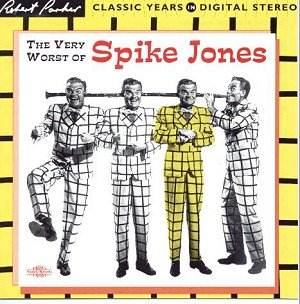
Love in Bloom. William Tell Overture. The Charleston. Cocktails for Two. That Old Black Magic. The Blue Danube. Liebestraum. Drip Drip Drip (Sloppy Lagoon). My Old Flame. McNamara's Band. The Glow Worm. Chloe. Holiday for Strings. You always hurt the one you love. Dance of the Hours. Luara. Hawaiian War Chant. Knock Knock (Who's There). All I want for Christmas. Happy New Year.
When I was a young boy, in the late 1940s, with two teenage female cousins perpetually swooning over Dick Haymes and Bing Crosby, I used to relish spiting them by playing Spike Jones's anarchic Cocktails for Two and You Always Hurt the One You Love at full blast.
Spike with his gang of lyrical and light classics terrorists were let loose around that time, and were often heard as an antidote to all the saccharine on BBC record requests programmes like Forces Favourites. This, 'The Very Worst of Spike Jones' is a collection of 20 of his marvellous missiles recorded between 1945 and 1949.
Spike used a battery of seemingly innocuous percussion devices such as temple blocks, cow bells, washboards, bell trees, swanee whistles, bird calls, gongs, cymbals and even hard stuff like anvils, hammers, pistols, car horns, police sirens phone bells, cash registers and such satanic electronic devices as "the polarised vibrating gong" to explode, even implode innocent tunes. On this album he damns The Blue Danube, shreds Liebestraum and devastates the William Tell Overture --before turning it into a horse race.
Innocent lyrics are tortured. Immediately, in Love in Bloom the question "Can it be the trees?" provokes a cry of "Timber!"; while the line "Is it all a dream?" is answered by loud snoring. Poor Chloe's name is tortured ("Hi Chloe! - what d'ya knowee?") and the words, "...nightshade's falling..." heralds unimaginable cacophony. Cocktails for Two's early lyric "in some secluded rendezvous" is answered by a gross dissonance of car horns, whistles and general thuds; and, later, you are not spared the raucous chorus of drunken hiccups. And you really don't want to know what they do to the melody and words of That Old Black Magic and You Always Hurt the One You Love.
It seems, at last, that one song will have some due respect. David Raksin's Laura (yes, that of the film) is played by Spike Jones's other orchestra - but no! - peace just cannot last and its only a matter of time before the boys wreak their usual havoc - in spades. Peter Lore, or the aptly named impressionist Peter Gory, adds a ghoulish touch to My Old Flame. He contributes such endearing lyrics as - "I can't even think of her name - I'll have to look through my collection of human heads...my new loves aren't the same; many of them won't even let me strangle them!"
Coming close to legitimacy, though, is Spike's affectionate recalling of The Charleston but even here horselaughs and gunshots invade.
Spike appeared in a number of films including Thank Your Lucky Stars and Variety Girls and had his own TV show. If you have a taste for irreverence, every one of these cues will have you cheering. Come back Spike, your slingshots are sorely needed today.
Reviewer
Ian Lace

************************************************************** EDITOR’s RECOMMENDATION July 2000 **************************************************************
Collection: Swing Legends:
Glenn Miller
NIMBUS NI 2001 [65:11]
Crotchet Amazon USA

Here we go again. Boulder Buff. My melancholy Baby. Star Dust. Rug Cutters Swing. Pennsylvania 6-5000. Slow Freight. Slip Horn Jive. The Boogie Woogie Piggy. Pavanne. Pagan Love Song. When Johnny comes marching home. Runnin' Wild. Tuxedo Junction. Glen Island Special. Johnson Rag. A String of Pearls. I dreamt I dwelt in Harlem. Moonlight Serenade. Farewell Blues.
Robert Parker, the Australian sound engineer responsible for refurbishing the music for the albums in this Nimbus series, has excelled himself here. Working from pristine Australian 78rpm pressings, he has created spectacular stereo sound that makes these Glenn Miller favourites sound as if they were recorded only yesterday. Listen to the fidelity of the instrumental harmonics in A String of Pearls for instance. Now we really do have the chance to fully savour the genius that was Glen Miller.
As the liner notes relate, "Glenn Miller's Orchestra in the 1940s was one of the finest big bands of the Swing Era. The popularity and reverence with which it is still regarded is unmatched - even in comparison with such outstanding contemporary bands as those of Duke Ellington, Benny Goodman, Fletcher Henderson and Count Basie.
"Apart from Miller's superb musicianship, his was a high multi-media profile: raised by appearances in Hollywood films, radio broadcasts and on gramophone records. His untimely death on 15th December 1944 during military service, at the age of 40, undoubtedly fuelled the legend; culminating in the glossy but factually inaccurate bio-pic of 1953 starring James Stewart as an idealised Glenn Miller."
This album of 20 numbers includes many of the great hits including: Star Dust; Moonlight Serenade; Pennsylvannia 6-5000; A String of Pearls and Tuxedo Junction (but why omit Little Brown Jug?) The liner notes include a picture of the band with many of the artists inset. And the fully credited numbers include a number of distinguished names including: Billy May, and Tex Beneke who makes his tenor sax all but talk.
An album not to miss.
Reviewer
Ian Lace

Collection: Salon Orchestral Favourites Vol.1
Salonorchester Schwnaen directed by Georg Huber
NAXOS 8.554756
Crotchet Amazon UK Amazon USA

The Skater's Waltz op.183 (Waldteufel). Brise de mer Mattinata (Leoncavallo). Tango (Albeniz). Poeme (Fibrich). Melodie in F major (Rubinstein). Serenade No.1 (Drdla). Il bacio (Arditi). Drunt' in der Lobau (Strecker). Die Millionen des Harlekin - Serenade (Drigo). El relicario (Padilla). Spiel auf deiner Geige das Lied von Lied und Lust (Stolz). Wien du Stadt meiner Traume (Sieczynski). Serenata (Toselli). Sie horen Paul Lincke - Potpourri (Lincke)
Picture an inn in the Austrian Tyrol, a prince incognito as a commoner, gazes into the eyes of a beautiful maiden while they are serenaded by a gypsy orchestra and served by girls in fetching national costume. Imagine a late Victorian/Edwardian drama played out in a hotel lounge with a palm court orchestra playing in the background. Visualise a Spanish café with diners seated around a small dance floor on which the hero and heroine are dancing the tango. These are typical scenes we've seen in countless movies.
Ten to one, one of the melodies on this album will have been played by those on-screen bands. This is one of those albums where you recognise practically all the tunes but can't put a name to them. You will probably recognise one or two pieces by name and composer -- Rubinstein's Melody in F and Waldteufel's Skater's Waltz, especially. The composer's names are often familiar: Leoncavallo, composer of the popular opera, Pagliacci; operetta composer, Robert Stolz; Isaac Albéniz; Heinrich Strecker, and Paul Lincke whose tunes that make up the most substantial Suite, Potpourri are instantly recognisable.
The melodies are played elegantly and unselfconsciously in the true spirit of the original salon music by the ten-piece Salonorchester Schwann. This is an undemanding and very pleasant hour of undemanding music; an unashamed romantic and nostalgic wallow. This is a very good start to a new series and I look forward to succeeding issues. The contents of the album is given below
Reviewer
Ian Lace

DVD Concert Review "American Night"
George GERSHWIN (1898-1937)
Highlights from Porgy and Bess
Willard White (Porgy); Cynthia Haymon (Bess); Damon Evans (Sporting Life)Cynthia Clarey (Serena) and Marietta Simpson (Maria).
Rhapsody in Blue with Wayne Marshall (piano)
Songs: Someone to Watch Over Me and I Got Rhythm - Marietta Simpson and Cynthia Clarey with Wayne Marshall.
Leonard BERNSTEIN (1918-1990)
Candide Overture; Prelude, Fugue and Riffs.
Berlin Philharmoniker; Rundfunkchor, Berlin Conducted by Sir Simon Rattle.
TDK Mediactive [85 minutes] EAN: 5 450270 001552.
You can obtain this from BlackStar
Enter American Night in the search box and then select Berlin Philharmonic - American Night (DVD) (1995)
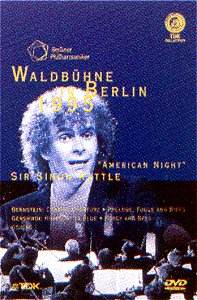
This is another DVD recording of an open-air concert, in 1995, in a Berlin Park, attended by a huge audience for an evening of light classics performed by the Berlin Philharmonic. As in the Daniel Barenboim "Latin American Night" concert which I reviewed on this site last month, the DVD digital 5.1 sound is excellent, full bodied and well defined with first class pictures.
Rattle's Glyndebourne performances and recording of Gershwin's Porgy and Bess are justly celebrated and he brings his superlative cast to this concert. Willard White's oaken tones lend strength and dignity to the role of Porgy. He is carefree and optimistic in 'I got plenty o'nuttin'; tender in his duet with 'Bess, you is my woman now'; pained and vulnerable in 'Oh, Bess, oh, where is my Bess?'; and fatally optimistic in the rousing final aria of the opera 'Oh Lawd, I'm on my way.'
Cynthia Hayman is a honey voiced Bess warm and loving yet insecure and vulnerable. Her lovely velvety soprano voice blends perfectly with Willard White's in their duet and she is sweetly soothing in her lullaby, 'Summertime'
But it is Damon Evans as Sporting life who runs away with the show with his powerful, individual larger-than-life renderings of 'It ain't necessarily so' and 'There's a boat that's leavin' soon for New York' - what personality, what projection, what magnetism!
Wayne Marshall gives a finely nuanced, articulate and thoughtful reading of the Gershwin Rhapsody. But this is rather an uneven performance with the Berlin players - especially the brass - often playing as though they were in a Munich beer garden rather than in Greenwich Village; and the big tune is spoilt by some untidy, fuzzy ensemble playing. The clarinet soloist, however, is excellent. I would have preferred to have heard the Berlin players having much more fun with this music. The same remarks must apply for Bernstein's Candide Overture which receives a rather brisk performance and the lovely central lyrical episode would have benefited from a more relaxed pace and a warmer treatment. Bernstein's astringent Prelude, Fugue and Riffs fares much better with its biting jazzy trumpet and trombone choruses echoed by massed saxophones and a small instrumental grouping of bass, piano (Marshall again) and clarinet.
Another highlight comes in the closing stages of the concert with two Gershwin songs sung superbly by Cynthia Clarey and Marietta Simpson accompanied by Wayne Marshall. Marietta Simpson especially shines in her rendering of 'Someone to Watch Over Me' - this lady has a wonderful way of putting a song over with a smile that just radiates warmth and sincerity and a voice, particularly in its smoky lower register, to make your toes curl.
Overall

Ian Lace
Video Review
Arabian Nights with music by Richard HARVEY
TV HALLMARK ENTERTAINMENT/WARNER VISION INTERNATIONAL 8573-82283-3 (2.18)
RATED: PGYou can obtain this from BlackStar Enter Arabian Nights in the search box and from the resulting list select Arabian Nights (2000)
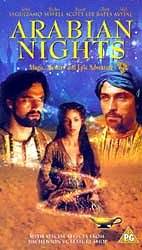
This slightly campy television production features several stories taken from the classic 'The Thousand and One Nights' for a two hour plus epic of magic and adventure.
The framing device centres around a mad Sultan who plans to have his new wife killed the morning after the wedding (apparently he wasn't that crazy, as he decided to wait until the morning after!). So in an attempt to delay her impending execution she spins a number of fantastic yarns to keep him entertained, always promising to continue the next evening and so buying herself another day.
Among the stories told there are probably the most well-known of all the Arabian Nights tales in 'Ali Baba and the Forty Thieves' and 'Aladdin'. However, the tone of the pieces is pitched at an almost juvenile level and there are even moments of Pythonesque humour thrown in, which seem at odds with the setting and the style of the original tales. In fact the account of BacBac the Sultan's favourite jester whose sudden death causes all manner of complications, is played as traditional English farce, although admittedly there are one or two amusing moments provided by the Oriental with the 'lethal hands'!
The main problem is that this light approach with modern sensibilities (no doubt believing it would make it more accessible) actually undermines the stories, as they have no sense of either dramatic or emotional tension. It's all rather like a pantomime on a grand scale, although presumably that was the intention.
There are few opportunities for the actor's to shine, with Dougray Scott (the villain of the upcoming 'Mission Impossible 2') not really meeting the challenge of the difficult role of the deranged Sultan. Mili Avital, as the storyteller Scheherazade, does far better though, while the charismatic Jason Scott Lee (exceptional as the titular character in 'Dragon: The Bruce Lee Story) brings energy to the role of Ali Baba. John Leguizamo in dual roles as opposing genies looks impressive enough, although at times his dialogue is a little trite. Incidentally Leguizamo's portrayal of the weaker of the two genies is very reminiscent of his turn as the evil Clown in 'Spawn'.
The final story of the brothers who are sent on a quest to find the 'greatest wonder in the world' is probably the best with its marginally more serious tone, but this leads into a finale that is weak at best, as various strands taken from all the different tales are used to win victory for the now fully restored Sultan.
The effects works by Jim Henson's Creature Shop is accomplished enough without really deserving any particular praise, although there are some nice scene transitions that work very well.
As far as the score is concerned, Richard Harvey's music is really exactly what you might expect, with its authentic Arabian flavour and the use of several traditional instruments and styles. But it is a score that while entirely serviceable is also wholly forgettable. It's one of those functional pieces of work that just plays along in the background as nothing more than just another sound effect. You would be hard pressed indeed to come away remembering a single theme or melody.
Taken as a whole, this made-for-TV spectacular is light-weight entertainment and when compared with Hallmark's other adaptations of classic works of literature such as 'Merlin' and in particular the outstanding 'Gulliver's Travels', does not stand up very well at all.
Harmless, undemanding viewing with a strong vein of simple-minded humour.
Reviewer
Mark Hockley


 |
| Discs
on these pages are offered for sale. There is also a page of search
engines from a selection of on-line retailers
here.
Please support this web-site by buying your discs here. Disclaimer: Every effort is made to make sales links to the correct disc but, in the end, you must take responsibility for checking that what you are purchasing is what you want. Some of these discs were not actually available for sale at the time of posting but a link has been made in anticipation of their forthcoming availablility. |
Return To Film Music on the Web
e-mail: info@musicweb.uk.net